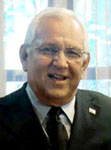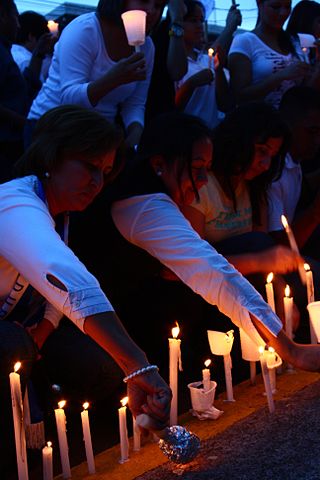Related Research Articles

Politics of Honduras takes place in a framework of a multi-party system presidential representative democratic republic. The President of Honduras is both head of state and head of government. Executive power is exercised by the government. Legislative power is vested in the National Congress of Honduras. The party system is dominated by the conservative National Party of Honduras, the Liberal Party of Honduras, and Liberty and Refoundation.

The Armed Forces of Honduras, consists of the Honduran Army, Honduran Navy and Honduran Air Force.

Óscar Arias Sánchez is a Costa Rican activist and Nobel Peace Prize laureate. He was President of Costa Rica from 1986 to 1990 and from 2006 to 2010.

Porfirio Lobo Sosa also known by his nickname, Pepe Lobo, is a former Honduran politician and agricultural landowner who served as President of Honduras from 2010 to 2014. A member of the conservative National Party and a former deputy in the National Congress of Honduras from 1990, he was president of the National Congress of Honduras from 2002 to 2006. He came second to Manuel Zelaya with 46% of the vote in the 2005 general election. After the military ousted Zelaya in a coup d'état, Lobo was elected president in the 2009 presidential election and took office on 27 January 2010.

José Manuel Zelaya Rosales is a Honduran politician who was President of Honduras from 27 January 2006 until his forcible removal in the 2009 coup d'état, and who since January 2022 serves as the first First Gentleman of Honduras. He is the eldest son of a wealthy businessman, and inherited his father's nickname "Mel". Before entering politics he was involved in his family's logging and timber businesses.

Yani Benjamin Rosenthal Hidalgo is a businessman, politician and former convict.

Roberto Micheletti Baín is a Honduran politician who served as the interim president of Honduras from 28 June 2009 to 27 January 2010 as a result of the 2009 Honduran coup d'état. The Honduran military ousted the President, and the National Congress read a letter of resignation, which was refuted two minutes later by Manuel Zelaya in conversation with CNN en Español; days later, the coup-plotters claimed that the Supreme Court had ordered to forcefully detain President Manuel Zelaya because "he was violating the Honduran constitution"; Zelaya was exiled rather than arrested. Micheletti, constitutionally next in line for the presidency, was sworn in as president by the National Congress a few hours after Zelaya was sent into exile by the Honduran military. He was not acknowledged as de jure president by any government or international organization. The 2009 general election took place as planned in November and elected Porfirio Lobo Sosa to succeed Micheletti.

The 2009 Honduran constitutional crisis was a political dispute over plans to either rewrite the Constitution of Honduras or write a new one.
International reaction to the 2009 Honduran coup d'état of June 28, 2009, was that the coup was widely repudiated around the globe. The United Nations, every other country in the Western Hemisphere and others, publicly condemned the military-led 2009 Honduran coup d'état and ouster of Honduran President Manuel Zelaya as illegal and most labelled it a coup d'état. The Obama administration, along with all other governments in the hemisphere, branded the action a "coup." Every country in the region, except the United States, withdrew their ambassadors from Honduras. All ambassadors of the European Union were recalled. Venezuela said it would suspend oil shipments, and Honduras's neighbors — El Salvador, Guatemala and Nicaragua - stopped overland trade for 48 hours. The World Bank and Inter-American Development Bank suspended lending to Honduras.
The 2009 Honduran constitutional crisis was a political confrontation concerning the events that led to, included, and followed the 2009 Honduran coup d'état and the political breakdown associated with it. The coup was repudiated around the globe, but Roberto Micheletti, head of the government installed after the coup, has claimed that the Honduran Supreme Court ordered the detention of Manuel Zelaya, deposed President of Honduras, and that the following succession was constitutionally valid.

The 2009 Honduran coup d'état, which took place during the 2009 Honduran constitutional crisis, occurred when the Honduran Army, following orders from the Honduran Supreme Court, ousted President Manuel Zelaya on 28 June 2009 and sent him into exile. Zelaya had attempted to schedule a non-binding poll to hold a referendum on convening a constituent assembly for writing a new constitution. Despite court orders to cease, Zelaya refused to comply, and the Honduran Supreme Court issued a secret arrest warrant dated 26 June. Two days later, Honduran soldiers stormed the president's house in the middle of the night, detained him, and thwarted the poll. Instead of putting him on trial, the army put him on a military plane and flew him to Costa Rica. Later that day, after reading a resignation letter of disputed authenticity, the Honduran Congress voted to remove Zelaya from office and appointed Head of Congress Roberto Micheletti, his constitutional successor, to complete his term. This was the first coup to occur in the country since 1978.
The Honduran fourth ballot box referendum was a planned non-binding referendum by Honduran president Manuel Zelaya to gauge public opinion on a second, binding referendum aimed at convening a constitutional assembly. The referendum would have run concurrently with the November 2009 presidential, congressional, and mayoral elections. Some Hondurans opposed the plan, including many politicians from the two largest parties. When Zelaya pushed ahead with plans for this referendum on whether to include a fourth ballot box, the Supreme Court issued a warrant for his arrest and the army expelled him from the country in a coup d'état on June 28, precipitating the 2009 Honduran constitutional crisis.
Public opinion on the 2009 Honduran coup d'état is divided in Honduras. There are three known opinion polls on the 2009 Honduran constitutional crisis. The polls show polarized Honduras. The first CID-Gallup showed support for President Manuel Zelaya's removal from office because of his actions but not the manner in which it was carried out. Subsequent opinion polls showed higher levels of opposition to the events of the coup, though the opinion of the government it inaugurated was more evenly mixed. According to the latest poll in October, only 48% of Hondurans regard Roberto Micheletti's performance as good or excellent, and 50% as bad or poor. Porfirio Lobo Sosa, an opposition member, led polls before the November elections and subsequently won the elections.
The Committee for the Defense of Human Rights in Honduras is a human rights NGO in Honduras founded in 1981.
Alleged Financial irregularities during the Manuel Zelaya administration was an incident in Honduran politics in 2008 that related to squandering and embezzlement of presidential expenses.

Unión Cívica Democrática is a network of forty Honduran activist organizations, which took an active part during the 2009 Honduran constitutional crisis, promoting several demonstrations against the former ousted president Manuel Zelaya.

During the Salvadoran Civil War, on 16 November 1989, Salvadoran Army soldiers killed six Jesuits and two others, the caretaker's wife and daughter, at their residence on the campus of Central American University in San Salvador, El Salvador. Polaroid photos of the Jesuits' bullet-riddled bodies were on display in the hallway outside the chapel, and a memorial rose garden was planted beside the chapel to commemorate the murders.

The nations of Honduras and Mexico established diplomatic relations in 1879. Both nations are members of the Association of Caribbean States, Community of Latin American and Caribbean States, Organization of American States, Organization of Ibero-American States and the United Nations.
References
- 1 2 "Recuerdan masacre de Los Horcones con misa". La Prensa. 2009-06-16. Archived from the original on 2009-07-10. Retrieved 2009-12-14.
- 1 2 Robert Gregory Williams: Export agriculture and the crisis in Central America, p. 126
- ↑ "Lucas Aguilera". La Tribuna.
- ↑ "Religion: Blood and Land". 18 August 1975. Archived from the original on October 23, 2012. Retrieved 10 March 2017– via www.time.com.
- ↑ "Crisis in Honduras - What was really behind the removal of President Manuel Zelaya, and is he likely to be reinstated?". Poder. Archived from the original on 2011-07-25.
- ↑ "Zelaya hometown provides look at divided Honduras". Guardian. 2009-07-07.
- ↑ "Como un mártir con pistolas". El Mundo. Archived from the original on 2009-10-03.